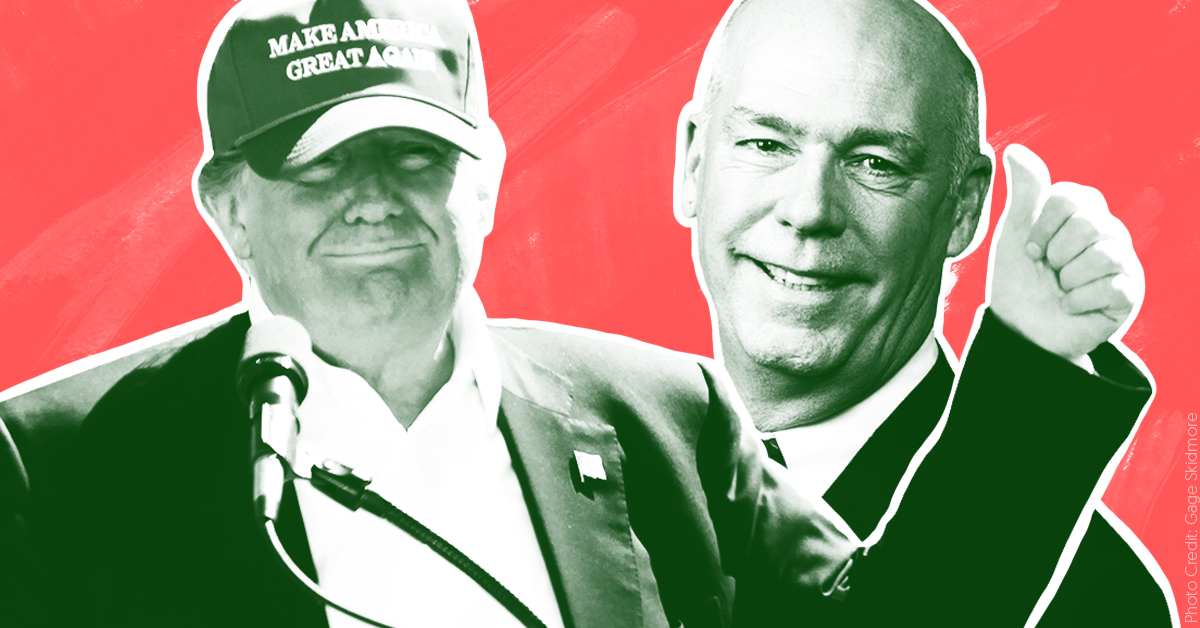
Melissa Joskow / Media Matters
In June, five staffers in the newsroom of the Annapolis, MD, Capital Gazette were murdered by a man with no apparent political motive who had a personal grudge against the paper. In brief remarks from the White House following the attack, President Donald Trump commented, “Journalists, like all Americans, should be free from the fear of being violently attacked while doing their job.”
On Thursday night, the president added a caveat to that noble sentiment: Unless the person violently attacking journalists is a Republican.
At a rally in Montana, Trump explicitly praised GOP Rep. Greg Gianforte for assaulting a reporter last year, applauding the Republican congressman and calling him “my guy” before a cheering crowd.
On the eve of a special congressional election last May, Gianforte slammed Guardian reporter Ben Jacobs and began punching him after the journalist attempted to ask him about the House health care bill. Gianforte’s campaign attempted to lie about what happened, but there were witnesses and audio of the incident, so Gianforte ultimately pleaded guilty to misdemeanor assault two weeks later.
Gianforte’s attack on a reporter actually appeared to bolster his standing in the Republican Party. The conservative movement’s pro-Trump voices rallied to Gianforte in the wake of the attack, his campaign received a surge of donations, and Gianforte won the election and was seated without incident. The message from the GOP was clear: Physically attacking a reporter would not bar a party member from the halls of power.
Last night, the president of the United States went even further, making clear that he believes such crimes should be celebrated.
“Greg is smart, and by the way, never wrestle him,” Trump said, to laughter from the crowd. “Any guy that can do a body slam, he's my kind of,” he added. The president then mimicked a wrestling move, said, “He’s my guy,” and applauded in Gianforte’s direction as his audience cheered.
Trump went on to describe how, while in Rome for a state visit, he “heard that [Gianforte] body slammed a reporter” -- as he said this, Trump pointed at the journalists covering his speech, while the crowd roared. The president explained that his immediate reaction to the report that a U.S. politician had assaulted a member of the press was “this is terrible, he’s going to lose the election,” before concluding that in Montana, “it might help him, and it did.”
The president had hinted that he supported Gianforte’s attack on a journalist at a rally in September. But these latest remarks cross a new threshold in the president’s rhetoric against the press, with Trump explicitly encouraging violence against journalists.
Trump has spent the last few years demeaning, delegitimizing, and dehumanizing the press, arguing that they make up stories to damage his administration and calling them the “enemy of the people.” He attempts to limit the impact of damaging stories by convincing his supporters that he is the only truthful source of information about himself.
Neither warnings from journalists and journalism advocacy organizations that his vitriolic rhetoric is putting reporters in physical danger; nor the arrests of individuals who used that rhetoric while threatening to murder journalists; nor the apparent murder of a U.S.-based journalist by a foreign government have halted Trump’s anti-press campaign.
Now, as Trump, his party, and the Fox News propaganda apparatus are trying to get Republican voters to the polls by warning them that they could be killed by the Democratic “mob,” the president is literally applauding a Republican politician’s criminal assault on the press.